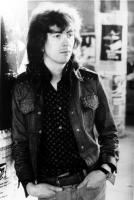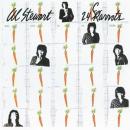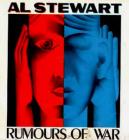It's a shame about Stalin, the curator said
He really was one of the best
Just look at the detail on that head
Too bad to melt him down with the rest
But since they wrote him out of the history books
Nobody gives him a second look
It's amazing how little time it took
And now he's never gonna get his statue up in Red Square
I remember Krushchev, the old man said
He had real strength in his jaw
The setting sun would turn his skull pale red
But now they've packed him off to the store
He used to know how to stir things up back then
Banging his shoe on the table at the UN
He said he'd bury the west again and again
But now he's never gonna get his statue up in Red Square
Too bad about Lenin, the old man sighed
he really had quite a run
For seventy years he was idolized
Even though he missed most of the fun
But the new revolution promised everyone cars
So they burned down the Kremlin and brought back the Tsars
Now they're spraying blue paint over all the red stars
And he doesn't even have his picture up in Red Square
He really was one of the best
Just look at the detail on that head
Too bad to melt him down with the rest
But since they wrote him out of the history books
Nobody gives him a second look
It's amazing how little time it took
And now he's never gonna get his statue up in Red Square
I remember Krushchev, the old man said
He had real strength in his jaw
The setting sun would turn his skull pale red
But now they've packed him off to the store
He used to know how to stir things up back then
Banging his shoe on the table at the UN
He said he'd bury the west again and again
But now he's never gonna get his statue up in Red Square
Too bad about Lenin, the old man sighed
he really had quite a run
For seventy years he was idolized
Even though he missed most of the fun
But the new revolution promised everyone cars
So they burned down the Kremlin and brought back the Tsars
Now they're spraying blue paint over all the red stars
And he doesn't even have his picture up in Red Square
inviata da Marcia - 8/4/2009 - 14:21
×
![]()





Album: "Seemed Like a Good Idea at the Time"
History and references behind Al Stewart's songs.
Joseph Vissarionovich Stalin (1879 - 1953)
Stalin was born Iosif Vissarionovich Dzhugashvili in Gori, Georgia, Transcaucasia. He attended the parish school in Gori, and entered the seminary of Tiflis in 1894. There he demonstrated himself to be an able student and ambitious leader. In 1898 he joined a Georgian socialist organization and came under the influence of Marxism. In 1899, just prior to graduation, he was expelled from the seminary because of his "disloyal" views.
He was arrested in 1902 and remained in prison until 1903. While in prison he was elected a member of the Social Democratic committee. He was deported to Siberia, escaped, and returned to Tiflis in 1904 shortly after the Social Democratic Party had split into bolsheviks and mensheviks. At this point he was under the influence of Lenin's writings, and in underground publications he translated Lenin's ideas into Georgian from the Russian.
He played no real part in the revolution of 1905, but advocated a policy of agrarian revolution identical to that adopted by the party in 1917.
Although Stalin did not play an important role in the 1917 revolution, he did lay groundwork behind the scenes. He was an editor of "Pravda", and helped organize Lenin's escape from Petrograd in July.
After the Bolshevik victory he was named comissar of the nationalities, a post he held for 5 years.
In April 1922 he moved to consolidate his power as Lenin's ill health became obvious. He was appointed secretary general of the party, and in this post soon gained control over the whole machinery of the party and the government.
In 1923 Stalin, Zinoviev and Kamenev joined forced to keep Trotski out of power. After the defeat of Trotski in 1925, Stalin openly broke from Zinoviev and Kamenev, and embraced Bukharin and his associates.
At the height of the drive to industrialize Russia, Stalin introduced the constitution of 1936. At this point he staged purge trials in which the old bolsheviks and military leaders were charged with treason, terrorism and espionage. They were brought to prisons to "confess" their guilt and were either exiled or executed.
Vladimir Lenin (1870 - 1924)
Born Vladimir Ilyich Ulyanov, he was the founder of Bolshevik communism, and the greatest single driving force in the 1917 Revolution.
His older brother, Aleksandr, took part in a plot to assassinate Alexander III and was executed in 1887. It is believed by some that this may have been a turning point in Vladimir's decision to embrace revolution.
He entered Kazan University as a law student in 1887, but was expelled for taking part in a student gathering. He received his law degree in 1891 from St. Petersburg University.
By 1893 he had moved to St. Petersburg and had become an expert on Marxism.
In 1895 he went abroad to make contacts and learn firsthand about European socialism. On his return to Russia, he began organizing the Union for the Struggle for the Liberation of the Working Class in St. Petersburg. He was arrested on December 20, and spent 14 months in prison. In 1897 he was exiled to Siberia for three years.
In the following years, he steadily built his influence through publications and contacts.
The revolution of 1905 fell short of Lenin's expectations, and did not offer him the opportunity to effect his plans for Russia. The 1917 revolution, however, did provide him what he wanted. The peasantry rushed for land regardless of law, and Lenin came out with the idea of a soviet constitution based on seizures by mobs wherever they might be. This served the purpose of encouraging the peasantry to push forward, and silenced those who wanted to wait for the passing of land reforms.
Lenin believed that only force could produce serious social change. "Not a single problem of the class struggle has ever been solved in history except by violence" he said.
Symptoms of serious illness began to manifest themselves in 1918, and Lenin died at Gorki near Moscow January 21, 1924.
Nikita Sergeevich Krushchev (1894 - 1971)
Nikita Krushchev was bornin 1894 in Kalinovka, Kursh Province. His father worked in a mine.
He came to power in 1953, following the death of Stalin, and made attempts to improve Soviet agriculture. These efforts fail.
The Soviet space program was begun under his leadership with the launch of Sputnik in 1957.
In September 23, 1960 he addressed the US General Assembly. It is during this speech where he removes his shoe and bangs on the table to emphasize his point.
The Berlin Wall was constructed under orders from Krushchev in 1961.
In October 1962 the US and USSR come very close to going to war over Krushchev's decision to place missles in Cuba ... less then 100 miles from the US.
In October of 1964 he is deposed by Leonid Brezhnev. Blamed for tarnishing the image of the Soviet Union, he died in 1971 and is buried in Moscow.